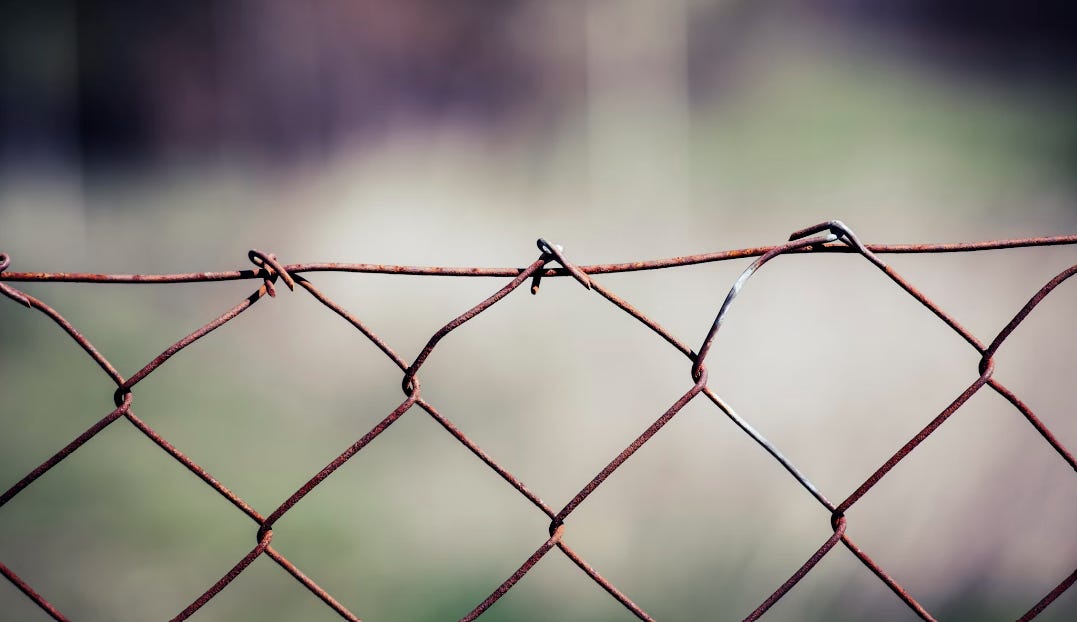“Ultimately a thing exists only by virtue of its boundaries, which means by a more or less hostile act against its surroundings.”
Robert Musil, A Man Without Qualities
The instinct of those who fear the dilution of their received identities is to build walls. In rare cases they are built with concrete, razor-wire fences, trenches or minefields. More often, and usually more effectively, their borders and boundaries are built with words.
Trump’s wall was envisioned as a barrier of concrete and iron twenty feet high and two thousand miles long. Sunak’s wall was envisioned as instant deportation to Rwanda. But they both knew, as all populists and nationalists know, that walls don’t need to be built as long as they are vividly imagined by those they intend to keep from trespassing across the sacred line between their thirsty deserts and the lands of milk and honey.
The partitions of apartheid had only to be spoken to exist. There were no walls or fences around the bantustans or the townships. The performative cruelty of the government’s official proclamations, their demeaning discourse of racial and cultural inferiority, the infamous “pass laws”, and a few vivid examples of brutal and deadly victimization of notable dissidents such as Steve Biko, were enough to enforce them by fear alone.
It is the instinct of the insecure to divide ambiguities into certainties. It is the instinct of the fascist to verbalize those divisions. All wars start with the words “us” and “them”.
The language of sex is most illustrative of the point.
The wall between male and female is fixed in our imaginations because it is built of the speech we cannot think without. Its bricks are personal pronouns, prepositions and antonyms: — he and she, him and her; under and over, dry and wet, inside and outside, cold and hot, hard and soft, in and out. So it’s unsurprising that the notion of gender as a choice has aroused as much or even more animus in conservative social circles than, say, the unspeakable daily and nightly horrors of Gaza.
Infallible nature apparently made humans. Gaza was made merely by fallible humans.
I have called this animus Sexit because its underlying motivation springs from the same segregative source that inspired an idiotic majority of Brits to set the European clock back to, I dunno, the divisions of 1914 or 1939.
It’s necessary but not sufficient to say that the anxiety provoked by gender fluidity has its roots in a more generalized discomfort with the fluidities of race, culture and national identity that are both the cause and the consequence of globalism. It is self-evident that the rancour of Brexit was a rage against flux, a nostalgia for a time when dichotomies were never false, and a bitter despair at the permeability of borders.
Nor is it especially enlightening to point out that the sticking point of Brexit was and still is the porousness of the boundary between two Irelands that can’t be wished away.
We draw lines between places, races and sexes not only because we fear the dissolution of the selves we make of their defining adjectives: not only to be able to say we are definitively white or black, male or female or British or not British; not only because there may not be words for the qualities that could define us beyond our race, age, citizenship and gender. I can’t speak for a wider humanity but in this culture we call Western, we make opposites so we can make transactions.
Transactions demand two distinct sides, two parties at odds: someone to sell, someone to buy. Division is the essence of every deal, the engine of the market, the founding principle of neo-liberalism. It has since become the small-cell carcinoma that has eaten its way into our Western way of thinking about everything from race to religion, from the divisions of society to the division of the sexes, from the divisions of politics to the divisiveness of power.
In England then and now, where the distinction between value and values was long ago erased by the Tory technocracy and lost in a fog of Etonian cant, and not only because my view of my adopted country is occluded by the long shadow of Brexit, we will, if we can, make transactions of love, sex and friendship the way we make transactions of property, forgiveness and blame. If we are to win, someone — anyone — must lose or be seen to lose.
English divorce law required until April of 2019 that one or other party had to be blamed for the failure of the marriage. Which more often than not required the partners at odds to collude to invent one.
The UK and the USA have two dominant political parties for the same reason. The opposition is the enemy by definition. We are at a loss to define who we are if we have no enemy to define who we are not. Coalitions don’t cut it. To be enemy-less is to cease to exist.
Brexit asked a binary question expecting a simple answer. It discovered instead a world of astonishing complexity, a hall of mirrors in which winners became losers and losers winners; a maze through a messy, non-negotiable middle in which generations to come will find themselves facing the doorless walls of their parents’ construction.
Sexit is the Brexit of sexual identity. It seeks to see the world in cut and dried dichotomies of male or female, taking or giving, over or under, cock or cunt: — of a border starkly dividing that which penetrates from that which is penetrated.
It abhors the in-between and the messy middle the way the so-called Brexiteers abhorred a skin darker than pale, the “citizens of nowhere”, and the intrusion of mixed and messy Asian and African colours into our clean and clear red, white and blue.
Nor is it by accident that the most vicious of pejoratives aimed at people unlike ourselves are phrased in colloquialisms of sex and sexual behaviors far more vulgar than those I’m obliged to use here to make my point. They are unmentionable for good reason.
Like Brexit, Sexit is an unholy war waged against ambivalence — a hostile act against the flux of our ever-changing preferences, inclinations and desires; against adolescence, in particular, because that is the time of our most voluptuous doubts. It uses the codes of religious or cultural exceptionalism to make women out of girls and men out of boys. At any price and at any cost to the in-between.
It shouts because it can’t say the words it would need to speak. It has no vocabulary between yes and no. It shouts louder to drown out the prurient whispers that keep it awake at night. It shouts because it fears, hates and longs to find itself in those unmapped pastures where the wild things go.
Its opposite is fluid, not fixed. Fluidity rejects the binary to embrace complexity. It seeks questions, not answers. It speaks most clearly without words.
It’s a creative search — as curious, insecure, tentative and terrifying as any other kind of creative exploration — for a sexual self defined and made whole by itself alone.
Gender fluidity is an exchange with the self, not a transaction with another. It seeks beginnings, not endings. If it has a destination it is a place without blame.
So too the fluidity of race, colour, national identity, political identity and personal choice. Sexit, Brexit and the twittering archangels of othering want to define us by what we are as stereotypical citizens of any given state — sexual, social, national or political — with the express intention of sabotaging our faith in who we are as individuals.
Our world is not divided by race, color, gender, or religion. Our world is divided into wise people and fools. And fools divide themselves by race, color, gender, or religion.
Mohamad Safa, United Nations, ECOSOC Rep.
So it’s both timely and heartening to see this principle articulated so publicly by the IOC on behalf of the landless, the homeless, the disenfranchised and the long dismissed:
It’s not where you’re from that defines you, it’s where you’re going.
IOC Refugee Olympic Team, TV commercial by Wieden+Kennedy Amsterdam
Hence, with more than several degrees of ambiguity, my exit stage-left to the land of in-betweeners: — a refugee, not from those I will love to my dying days, but from definitions that shackled me to a self I could no longer abide.
First published in She magazine, 2019. Amended, with kind permission, May 2024










Credit to Nike for sponsoring the IOC Refugee Olympic Team